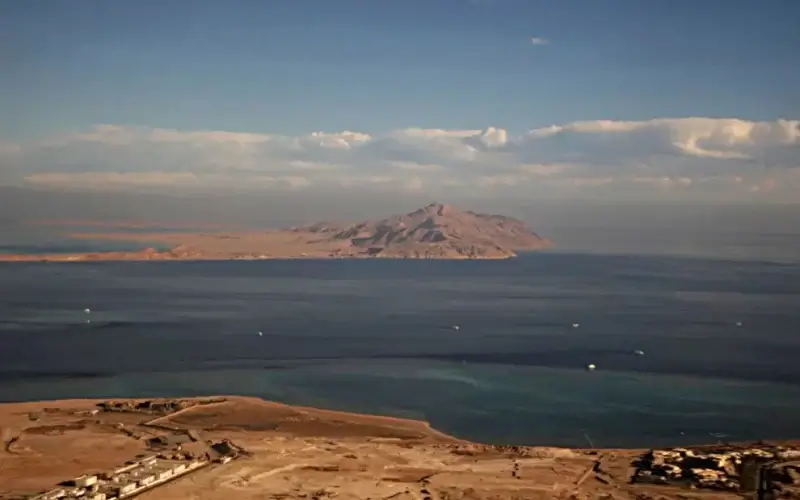In yet another move that could signal future normalization, Israel and Saudi Arabia have agreed to brand new security arrangements, allowing Egypt to transfer ownership of Tiran and Sanafir in the Straits of Tiran to Saudi Arabia. In his upcoming end of the month trip to the Middle East, President Joe Biden is expected to announce the agreement and praise the two countries for their cooperation. This agreement is sure to generate praise from many in the Middle East and international community as Israel and Saudi Arabia inch closer to full normalization.
As part of the agreement, the Saudi government has demanded that the multinational force currently on the islands of Tiran and Sanafir in the Straits of Tiran withdraw completely from the islands. Additionally, Israel has agreed to have its military forces stationed on what will remain as Egyptian soil to provide security in the area. The Saudi Arabia government will also allow Israeli airlines to fly over its airspace to allow Israeli-Muslims easy travel to the holy cities of Mecca and Medina from Ben Gurion Airport.
Saudi Arabia’s Foreign Minister Prince Faisal bin Farhan has not denied the negotiations with Israel but stated that diplomatic relations with Israel are not on the immediate horizon for the Arab state. The Saudi Foreign Minister went on to state that normalization with Israel will result in a path to peace with the Palestinians. In a recent interview, Israeli Foreign Minister Yair Lapid, addressed the notion of normalization with Saudi Arabia, explaining that it will only occur with small steps.
“It is encouraging that the Biden Administration is rethinking its approach to the Abraham Accords and seems to be trying to facilitate their expansion rather than take potshots at the peace treaties as it did in 2021. Hopefully, they are understanding now that the key to peace in the Middle East is not through Tehran, but through closer engagement with Israel and Saudi Arabia, who are our two key partners in the Middle East,” according to Gabriel Noronha, former U.S. State Department for Iran.
While the agreement has been hailed as a success, National Security and Middle East experts like Noronha simultaneously point out that the Biden Administration’s ongoing negotiations to revive the 2015 nuclear agreement and balance the scales of power between Iran, Israel and Saudi Arabia is a “mistaken view that would yield more peace and stability in the region. That view is a pure fantasy that failed when President Obama tried it in 2015. Instead, we should be standing with our allies and isolating Iran.”
The history of the issue of the Straits of Tiran between Israel, Saudi Arabia, and Egypt dates all the way back to 1979. During that time, the multinational force patrolled the islands located at the opening of the Red Sea, which was the only shipping route to the Israeli port city of Eilat. After Israel under Prime Minister Menachem Begin and Egyptian President Anwar Sadat signed a peace treaty in 1979, the condition of the islands of the Straits of Tiran arose because of its closures under Egyptian President Gamal Abdel Nasser leading up to the 1967 Six Day War with Israel.
“Saudi Arabia and Israel have been working together behind the scenes for years. That cooperation has centered on their mutual security concerns—the most prominent of which is the threat from the Islamic Republic of Iran. There have been incremental steps toward more open relations, especially since the signing of the Abraham Accords,” said Len Khodorkovsky, a former Deputy Assistant Secretary of State under the Trump Administration.
“To the extent the Biden administration is playing a constructive role toward continued warming of Saudi Israeli ties, it should be supported. However, the Biden Administration's hostile approach to the Kingdom and its reorientation toward Iran has hurt its credibility and the U.S. energy security,” Khodorkovsky said.
“Unless this incoherence of policy is resolved, I anticipate continued skepticism from Saudi Arabia and our other allies in the region toward the Biden administration, which will limit America's influence and make it harder to achieve our strategic objectives,” he said.
Prior to 1979, the kingdom of Saudi Arabia gave Egypt control of the islands, which agreed to return them later. In 2016, Israel also agreed to return the islands, but because alternative security arrangements were not finalized, the agreement never went through. The Biden administration has tried to bring about an agreement between the two sides, providing the president with a political win.
The history between Saudi Arabia and Israel has been a long and contentious one dating back to when the Jewish state was first established. During the late 1940s through the 1970s, Saudi Arabia and the entire Arab world was opposed to the Jewish state and supported Israel’s enemies and supported the Palestinian cause. The government under Faisal bin Abdulaziz Al Saud took the position that the Saudis would not normalize ties with Israel until the issue of the Palestinians was solved.
This stance has changed in the past several years, given the rise of the Islamic Republic of Iran’s influence in the region and the declaration by the Ayatollahs and their proxies to overthrow the Saudi Royal family from power. Currently, Saudi Arabia is bogged down in an ongoing proxy war in Yemen against Iranian-backed Houthi terrorists attacking Saudi oil refineries, using Iranian drones. Saudi oil shipments in the Strait of Hormuz have been attacked Islamic Revolutionary Guards Corps (IRGC) ships and drones.
According to Gabriel Noronha, there have been no military tensions between Israel and Saudi Arabia for some time and “the reality is that their common enemy Iran has brought the two nations closer together, particularly with intelligence cooperation against Iran's terrorism and nuclear ambitions. Each time a diplomatic breakthrough occurs, it makes it easier for the countries to cooperate even closer on other realms without having to hide it so much.”
“Iran's hatred of Israel is making it more of a pariah than ever before. It used to be Israel that was isolated in the region, now every time Iran condemns Israel for something, they have fewer and fewer voices joining them than before. Over the next decade, I think we will see that Iran's animosity toward Israel earns it even more censure from Arab nations than it earns them goodwill,” Noronha said.










